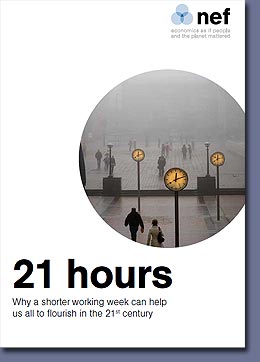 |
 |
|
Shorter Working Hours Is Key To Wellbeing In 21st Century
A new report by an independent think tank, the New Economics Foundation (NEF), is calling for a 21-hour working week, saying that such a change will soon be “inevitable” and that shorter hours are the key to greater well-being in the workforce. The foundation argues that: "Moving towards much shorter hours of paid work offers a new route out of the multiple crises we face today. The report,entitled 21 Hours, forecasts a major shift in the length of the formal working week as a consequence of dealing with key economic, social and environmental problems. However, the think tank says the change can be seen as a positive opportunity, rather than a threat. According to the NEF, forces pushing towards a shorter working week include:
These forces combine with a growing interest in people spending more time producing and delivering a share of their own goods and services, from co-produced care and neighbourhood-based activities, to food, clothing and other necessities. The authors of 21 Hours argue that a much shorter working week could help to tackle a range of urgent and closely related problems such as overwork, unemployment, over-consumption, high carbon emissions, low well-being, entrenched inequalities, and the lack of time to live sustainably, to care for each other and simply enjoy life. They say that there is nothing natural or inevitable about what’s considered ‘normal’ today. Time, like work, has become commodified – a recent legacy of industrial capitalism. Yet the logic of industrial time is out of step with today’s conditions, where instant communications and mobile technologies bring new risks and pressures, as well as opportunities. The challenge is to break the power of the old industrial clock without adding new pressures, and to free up time to live sustainable lives. The report shows that many people work longer hours than 30 years ago. Since 1981, two-adult households have added six hours — nearly a whole working day — to their combined weekly workload. It also consideres unpaid work as being part of the economy and claims that: "To meet the challenge, we must change the way we value paid and unpaid work. For example, if the average time devoted to unpaid housework and childcare in Britain in 2005 were valued in terms of the minimum wage, it would be worth the equivalent of 21 per cent of the UK’s gross domestic product." The report's conclusion is: "The challenge is to break the power of the old industrial clock without adding new pressures, and to free up time to live sustainable lives." Download the full report from the E-Library Database Source: Croners / NEF
|
